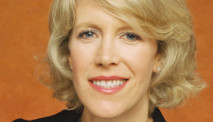Editor's note: Leslie Morgan Steiner, a Washington, D.C., native, is on the advisory boards of the DC Volunteer Lawyers Project, the One Love Foundation and the National Domestic Violence Hotline. She is author of the memoir "Crazy Love."
She spoke at TEDx Rainier in 2012. TED is a nonprofit dedicated to
"ideas worth spreading," which it makes available through talks posted
on its website.
(CNN) -- This week, as the Senate decides whether to
reauthorize the Violence Against Women Act and Valentine's Day
approaches, it's worth noting that most domestic violence victims don't
ask for roses, chocolate or federal funding. Instead, we have one simple
wish: We want the abuse to end.
We don't want the relationship to end.
This fact about "crazy love" surprises many people. How could you still love someone who has hurt you?

Leslie Morgan Steiner
The answer is as
complicated as love itself. We victims tend to be hope junkies,
open-hearted and optimistic. We believe that our loved ones are capable
of change. Some would say we are naïve. Others say we are too kind or
too forgiving. Often we cannot find the courage to leave an abusive
relationship until our life (or our children's safety) has been
threatened.
When victims end an
abusive relationship, the first thing we need is shelter. This is the
No. 1 request made by victims who call the National Domestic Violence
Hotline, the federally funded national helpline (1.800.799.SAFE). It is a
practical request -- a roof over our heads. But it is also an emotional
one -- the deep need to seek safety and to protect our children from
danger.
Become a fan of CNNOpinion
Stay up to date on the latest opinion, analysis and conversations through social media. Join us at Facebook/CNNOpinion and follow us @CNNOpinion on Twitter. We welcome your ideas and comments.
Many victims know
instinctively what friends and family usually don't: The most lethal
time in an abusive relationship is after you leave. More than 70% of
domestic violence murders happen after the victim has gotten out. Like 20-year-old Selina Brown,
who was shot in the face last year as she and her toddler daughter
tried to board a bus. So safe shelter is, naturally, our biggest
priority.
The second most common
request also surprises people -- even in a town like Washington, D.C.,
with nearly 100,000 lawyers. Victims say that after immediate shelter,
what we need most is legal advice and representation. Any woman who is
going to turn herself from domestic violence victim to a domestic
violence survivor needs this service.
I should know. I come from a family of Harvard-educated lawyers. Yet, when I left my abusive ex-husband
-- an Ivy League Wall Street trader who kept three loaded guns in our
house -- I had no one to accompany me to family court to get my
temporary restraining order made permanent, and no one to help me begin
divorce proceedings.
So I went to court alone.
Fortunately, a young
legal aid attorney from a local women's shelter showed up. She spoke to
my husband and the judge. She pointed me in the direction of the
bullet-proof glass window where my new restraining order awaited. She
recommended a divorce lawyer I could hire immediately.
Thanks to her, and
dozens of other strangers who helped me, I left my ex-husband. Today I'm
happily remarried and the mother of three wonderful children. I have a
black lab and drive a Honda Odyssey minivan. I couldn't have left and
rebuilt such an ordinary, happy life without the kindness of others.
Here in Washington, 700 registered pro bono lawyers
have joined forces with a new nonprofit, the D.C. Volunteer Lawyers
Project. It now has more attorneys than Washington's largest law firm.
The lawyers are typically stay-at-home moms craving volunteer work that
puts their legal training to good use.
The volunteer lawyers'
group provides mentoring, training, court appearance scheduling and
malpractice insurance, all within a $350,000 annual budget, which is
tiny considering it serves a city of more than 600,000 people. Since its
founding, it has helped more than 2,000 family violence survivors. In
2012, its lawyers donated more than 14,000 pro bono legal hours.
I call that true love.
This Valentine's Day,
I'd like to call on all lawyers in Washington and elsewhere to consider
helping stop domestic violence for good. The D.C. Volunteer Lawyers
Project model can be replicated in any small town or big city. By giving
victims a little pro bono assistance, lawyers can help make our
nation's dinner tables, homes and families the safe and peaceful oases
they should be. By giving a small amount of time, like the advocate who
helped me so many years ago, we can all help victims of domestic
violence.
Now that's a Valentine's Day present we can all get mushy about.

No comments:
Post a Comment